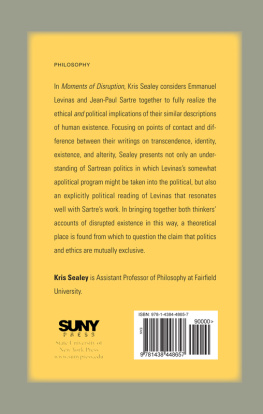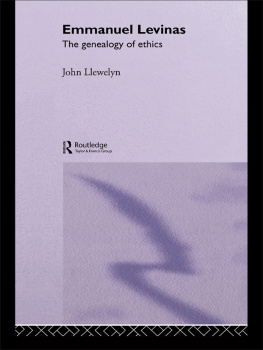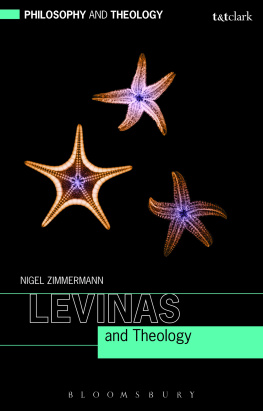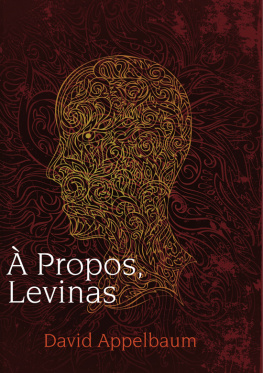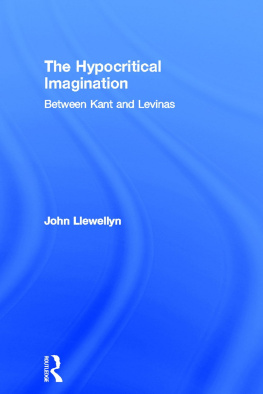WHAT PEOPLE ARE SAYING ABOUT
LEVINAS UNHINGED
Most defenders of Levinas have undercut his genius by presenting him either as a pious old finger-wagging grandpa or as Jacques Derridas halfhearted apprentice. In this book Tom Sparrow gives us the true Levinas: a formidable metaphysician who did more than anyone else to sensualize and concretize the work of Heidegger. Levinas is not in our rearview mirror, but remains in our motorcade today. He will still have much to teach us. Sparrow lucidly reminds us why.
Graham Harman, Associate Provost for Research Administration and Professor of Philosophy, American University in Cairo
Levinas Unhinged shows us another side of Levinas that is often ignored or overlooked. Sparrows Levinas is foremost a philosopher of the night, attuned to the shadowy underbelly of appearances. Removed from his role as the high priest of ethics, Levinas appears in a new way. Now, the terms horror, indifference, and facelessness all come to the foreground as central to an understanding of Levinasian philosophy. This provocative reading is thus not only a challenge to Levinas scholarship, it is also a challenge to materialist ontology more broadly. The result is a worthy contribution to current debates in speculative realism and phenomenology.
Dylan Trigg, Research Fellow at cole Normale Suprieure and University College Dublin
First published by Zero Books, 2013
Zero Books is an imprint of John Hunt Publishing Ltd., Laurel House, Station Approach,
Alresford, Hants, SO24 9JH, UK
www.johnhuntpublishing.com
www.zero-books.net
For distributor details and how to order please visit the Ordering section on our website.
Text copyright: Tom Sparrow 2012
ISBN: 978 1 78279 056 3
All rights reserved. Except for brief quotations in critical articles or reviews, no part of this book may be reproduced in any manner without prior written permission from the publishers.
The rights of Tom Sparrow as author have been asserted in accordance with the Copyright,
Designs and Patents Act 1988.
A CIP catalogue record for this book is available from the British Library.
Design: Stuart Davies
Printed and bound by CPI Group (UK) Ltd, Croydon, CR0 4YY
We operate a distinctive and ethical publishing philosophy in all areas of our business, from our global network of authors to production and worldwide distribution.
CONTENTS
For Graham Harman
The night stared me in the face, amorphous, blind, infinite, without frontiers.
Stanislaw Lem, from Solaris
The darkness immersed everything; there was no hope of passing through its shadows, but one penetrated its reality in a relationship of overwhelming intimacy. [Thomass] first observation was that he could still use his body, and particularly his eyes; it was not that he saw anything, but what he looked at eventually placed him in contact with a nocturnal mass which he vaguely perceived to be himself and in which he was bathed.
Maurice Blanchot, from Thomas the Obscure
Preface
Haunting Levinas
Emmanuel Levinas is a haunting figure. Inside his texts, too, there are ghosts.
For a while now I have wanted to write a book that would display some of the underappreciated dimensions of Levinass philosophy. This book would focus specifically on aspects not necessarily ethical in nature, but metaphysical instead; it would emphasize the dimension of materiality that accompanies, and in some respect grounds, his ethics. When taken as more fundamental to Levinass project than the ethical, the dimension of materiality presents Levinas in a light radically different from that which illuminates his popular reception. Some may see this as darkening his image. While not untrue, such a viewtypically expressed with a hint of reproachmisses the mark. I have assembled Levinas Unhinged to explain why. One recent day I realized that I had written several interrelated essayswhich is to say, a bookon Levinass philosophy. You are now reading that book. Its purpose is to exhibit what might be called a proto-materialist metaphysics leaking through the cracks of the familiar portrait of Levinas as a philosopher of transcendence. It resists the well-worn view that the Levinasian problematic is primarily, if not exclusively, ethical or theological in nature. The singular claim uniting the following chapters is that Levinas provides us with a speculative metaphysics and aesthetics which foregrounds the following: the body in its materiality; the irreducibility of aesthetic experience; the transcendental function of sensation; the ecological aspect of sensibility; the horror of existence. Levinas surprisingly keeps pace on occasion with philosophers of immanence like Gilles Deleuze. Therefore, what you find in these pages is a heterodox (perhaps heretical) and markedly non-phenomenological approach to Levinass philosophy, one that features his insistence that subjectivity is nourished by the aesthetic environment, that is to say, the matter of sensation.
Adherents of Levinass philosophy are notoriously protective of their master thinker, just as career Heideggerians often come off as dismissive of any commentary or criticism that does not issue from the inner circle of Heidegger scholarship. At times this adherence verges on religious piety, an attitude which really has no place in philosophy. Criticism of Levinas is often rebuffed as contrary to the spirit of Levinasian hospitality, as if highlighting the tone of an argument were enough to disarm its critical strength. Failure to enter the Levinasian problematic as Levinas understood it is seen as a failure to engage legitimately with the thinker, as if reading Levinas against his self-interpretation necessarily entails getting him wrong. It is perplexing that after the deconstructive revolution in reading, which for so long dominated the continental philosophy scene, this rebuttal carries as much weight as it does. It is doubly perplexing given that Levinas is often regarded as a principal ally of Jacques Derrida. As a reader of Levinas who places his ontology before his ethics, I read him otherwise than many of his commentators would have him read and perhaps otherwise than he would like to be read. This may be seen as an act of impiety, but whether or not it is heresy is irrelevant to the productivity of my reading. I am not trying to get Levinas right or advance his ethical program as it is typically understood. What I hope to have accomplished here is an account of Levinas as someone obsessed with matters besides God, the face of the Other, radical alterity, transcendence, and the usual Levinas catchwords. This is necessary, I think, because there are enough readers out there who believe that Levinas is little more than a quasi-religious thinker whose biggest contribution to philosophy is made as a member of the so-called theological turn in phenomenology denounced by Dominique Janicaud; others see him as a forerunner of Derridean deconstruction. I make little attempt to engage either of these readings here. With any luck this book will end up enticing some of the uninitiated into Levinass philosophy so that its metaphysical potential can be fully exploited.
The most familiar approach to Levinas obliges us to pass through his unique attempt to establish ethics as first philosophy. Nearly as influential is the reading of Levinas as a philosopher of difference or radical otherness. Additionally, he is seen as an undeniably central figure in the phenomenological movement (or as merely a phenomenologist, depending on your sympathies), as well as a Talmudic scholar. His contributions to political and environmental philosophy have inspired monographs and edited collections, but to a lesser extent and only recently. In the text that follows I present Levinas as first and foremost an engineer of ontology, as someone explicitly engaged in the establishment of a materialist account of subjectivity. At its most general level this book is about Levinass sustained attention to the tangibility of being and the corporeal dimension of human existence. As I have already admitted, this is a deviant way of casting Levinass project because it explicitly disregards the interpretation of his work that he and his faithful commentators provide. It does not keep with the spirit of Levinas. Nevertheless, my portrayal is grounded in evidence from the letter of his texts; this evidence is documented in the notes that close each chapter. The ontology I present is generated by Levinass forays into phenomenology, especially the concepts of intentionality, representation, sensation, embodiment, and affectivity, but it entails a radical rethinking of the nature of subjectivity, the constitution of the environment, and the relationship between body and world. This radicalization takes place when subjectivity and environment are refracted through the lens of sensibility. At the end of the day Levinass philosophy can be read (as I have here) as a concerted rehabilitation of the sensible, as he himself would say. Sensation and sensibility, I argue, are concepts just as important to Levinas as the Other, the face, God, infinity, transcendence, or discourse.



